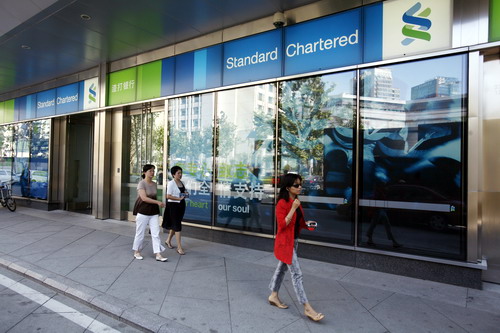Foreign banks remain optimistic over expansion in China
Updated: 2011-10-20 09:23
By Wang Xiaotian (China Daily)
|
|||||||||||
|
A Standard Charted PLC bank in Beijing. The 127 foreign banks' overall market share in China accounted for 1.83 percent in 2010. [Photo/ Bloomberg News] |
BEIJING - Foreign banks in China are still fighting hard to define their role in the Chinese market and expand their operations 10 years after China joined the World Trade Organization, said analysts.
"Foreign banks are losing market share while domestic banks are gaining competitiveness. Moreover, foreign banks are still not yet free from the pressures of the global financial crisis," said Johnson Chng, head of financial services for Bain & Co in Greater China.
Lim Cheng Teck, chief executive officer and executive vice-chairman for Standard Chartered Bank (China) Ltd, said China made a good start in opening up to foreign players but the threshold needed to be further lowered.
"We brought increased competition to the Chinese market and so provided more creativity and a better allocation of resources and improved the market efficiency," said Lim.
Melvin Teo, chief executive officer of DBS Bank (China) Ltd, a subsidiary of Singapore-based DBS Bank Ltd, said Chinese banking regulators are very concerned about the pace of expansion of foreign banks in China and want to make sure outlets are not opened too quickly or without appropriate regard for their likely success. "Prudence could also benefit our sustainable development," he added.
In 2006, China announced it was opening up the domestic market and yuan-denominated business to foreign banks. However, the fact that foreign banks need to get approval from the China Banking Regulatory Commission (CBRC) if they want to open new outlets has limited their expansion across the country.
Currently, a foreign bank is usually allowed to open only one branch in China each year in first-tier cities.
Foreign banks' total assets grew steadily between 2003 and 2007, stalled in 2008 and 2009 at the time of the stimulus plan, and grew again in 2010.
The 127 foreign players' overall market share accounted for just 1.83 percent in 2010, according to a report released by PricewaterhouseCoopers (PwC) International Ltd in June.
Facing strong competition from major Chinese banks and the high cost of developing extensive outlets, some foreign players have decided to quit the consumer banking sector and pay more attention to fields more attuned with their advantages, such as the investment banking business.
In December 2010, Royal Bank of Scotland Group PLC (RBS) announced it would transfer its retail and commercial banking businesses in China, including close to 25,000 clients in Shanghai, Beijing and Shenzhen, as well as its employees, to DBS China free of charge.
In addition, banks need to meet the required loan-deposit ratio of 75 percent and new capital regulatory parameters set by the CBRC, especially the 2.5 percent provision ratio.
While feeling the increasing weight of new regulations, coupled with tightening liquidity as the government seeks to curb inflation, foreign banks operating in China are still "surprisingly confident" about their prospects in the Chinese market, according to PwC.
"The market share figure fails to reflect how the foreign banks continue to redefine the market segments that offer them the opportunity to excel and plot a path of stable, long-term expansion," said PwC.
"We are very confident in our development in China and will continue our expansion plan," said Pierre Bonzom, CEO of commercial and personal banking at Societe Generale (China) Ltd, adding that the prospects for a universal banking model are still bright in China.
Related Stories
China tightens rules over banks' investment products 2011-10-10 09:15
Banks can do more to help SMEs 2011-09-29 13:21
Chinese banks' forex surplus hits $37.8b in Aug 2011-09-28 17:18
Foreign banks' profits lag domestic results 2011-09-20 09:34
- Themed restaurants attract many curious customers
- China still important IPO market: NASDAQ
- China reviews audit firms
- Local govt debts controllable: Regulator
- China to establish nationwide social credit system
- Time for China to dump US debt?
- Investment from EU drops in Sept
- ICBC Leasing orders 45 C919 jets











